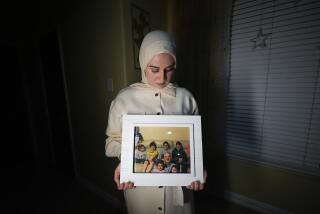CIA Says Voice on Tape Probably Hussein’s
- Share via
WASHINGTON -- CIA analysts have concluded that it is probably Saddam Hussein’s voice on a taped message released last week exhorting Iraqis to “provide a cover” for resistance fighters attacking U.S. forces.
The recording, first played on Arabic television channel Al Jazeera on Friday, is the latest piece of evidence to suggest that the deposed Iraqi leader survived the war and may be hiding in the country he ruled for more than two decades.
“Due to the poor quality of the tape, you can’t be 100% certain” it’s Hussein, said CIA spokesman Bill Harlow. “But after technical analysis, we believe it is most likely Saddam’s voice.”
Harlow said there was nothing in the tape that enabled agency experts to determine when it was made, or even rule out the possibility that it was recorded before the war.
But he said the operating assumption in the U.S. intelligence community was that Hussein is alive. Some of the comments on the tape appear to bolster that idea.
According to a CIA translation, the speaker says that “cells and brigades of jihad” have been formed to expel U.S. forces.
“I call on you to provide a cover for the heroic moujahedeen and not to give the infidel invaders and their collaborators any information,” he says.
The speaker claims to be in Iraq with “my comrades and brother members of the command,” and apologizes for failing to keep in better touch with the Iraqi people.
“I miss you so much, oh loved ones,” he says. “You know, beloved brothers and sons, that sending you an audio recording is not as easy as it used to be.”
At one point, the speaker seems to offer an explanation for the regime’s decision to fight -- and then go into hiding -- rather than submit to U.S. demands before the war or formally surrender as troops approached Baghdad. Submitting or surrendering, the speaker says, would have been an affront to God and a capitulation to “infidel colonial control.”
“We sacrificed our rule,” the voice says, “but we did not break our promise to God.”
Fresh evidence that Hussein is alive could further complicate U.S. efforts to stabilize Iraq and suppress a wave of violence that has killed at least 29 American soldiers since President Bush declared major combat to be over May 1.
The attacks on U.S. troops have been attributed in large part to members of Hussein’s Baath Party who remain fiercely loyal to a regime many Iraqis still believe could return to power. White House officials have acknowledged in recent days that Iraqis may be reluctant to cooperate with coalition forces because they fear reprisals if Hussein comes back.
Hussein has not been seen in public since he was toppled in early April. Videotapes of him that surfaced during the war also were deemed authentic, although there was some evidence that they were recorded before the invasion.
The voice on the tape that aired Friday said the recording was made June 14, although the CIA said there was no way to confirm that. The agency has said that other regime figures now in custody have said Hussein survived the war.
Despite the recent increase in attacks and sabotage, the war’s outgoing commander, Gen. Tommy Franks, said Monday that no extra troops were needed to shore up U.S. defenses.
“The sense that I have right now is that it’s not time to send in additional troops,” he told ABC’s “Good Morning America.” “We want
Other military officials continued to insist that the escalating attacks on U.S. and British troops are not nationally orchestrated.
But the assaults have become more deliberate and sophisticated as they have increased in recent weeks, Army Maj. Gen. Carl Strock said in a teleconference briefing from Baghdad.
“We have not seen any sort of central or national orchestration,” said Strock, deputy director of operations for the Coalition Provisional Authority, the U.S.-led occupation agency running Iraq. “But we do see more sophisticated attacks, a combination of explosive devices and direct fire, for example.”
Strock said the increasing attacks on Americans are partly a response to offensive operations by U.S. and coalition troops against insurgent forces.
“We are seeking the enemy out,” he said. “And when you get in that kind of a situation, you’re going to stimulate more action just by the nature of our tactics.”
Coalition forces have staged numerous raids in recent weeks to root out remnants of Hussein’s regime and loyalists believed to be involved in attacks against occupying forces.
More to Read
Sign up for Essential California
The most important California stories and recommendations in your inbox every morning.
You may occasionally receive promotional content from the Los Angeles Times.










